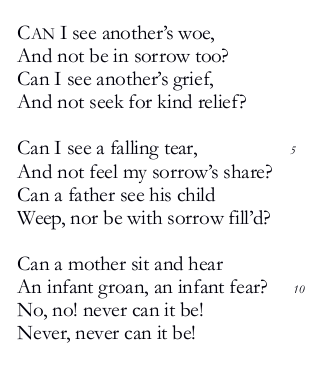A discussion amongst friends has caused me to tie together some threads in a couple of papers I’ve written recently, and to think about how we ought to respond to when we upset others. I’m particularly interested in how we should respond when the upset another feels is unjustified, and in whether we ought to feel sympathy towards them nevertheless.
Sympathy is an important and interesting emotion. It functions to make another’s unhappiness our own. When we see another distress, we imagine ourselves in their shoes. If our imagined feelings match those of the object of our imagination, then we are in sympathy with them. The belief that we would suffer similarly were we in their shoes leads to a judgement that their distress is therefore bad. Sympathy is thus an evaluative emotion.1
One interesting question is how we ought to respond to the unhappiness that we judge to be unwarranted. This sort of upset is prevalent in debates about how we ought to treat people who are offended by what we say, even though we think we have every right to say the words that have upset them. How should we feel about people who are upset by a picture of the Prophet, or because they have misinterpreted an innocent or well-meaning comment as an insult? Often, our response to upset that we judge to be unwarranted is hostility. “Stop taking offence!” we say, “it’s not my fault if you’re offended by my words.”
When we imagine ourselves in the other’s shoes we sometimes conclude that if we them then we would feel upset. But we may also take with us the belief that their reason to feel upset is wrong. When we decide that the other’s upset is ill-fitting then our sympathy evaporates. We no longer feel the other’s pain because we judge it to be the wrong response to circumstance.2 Perhaps this is wrong though.
Sometimes the cause of an agent’s distress is good for them (such as when I make a trip to the dentist), and sometimes it is deserved (such as when a criminal looses his liberty). But there are also cases where an agent may suffer distress as a result of the exercise of another’s agency in ways that are bad for the agent, but where no wrong is done to them. Such cases may occur when a person’s identity is bound up in a mistaken or unfalisifiable belief. When that belief is challenged, the agent feels a threat to their sense of self. Although the distress felt is unjustified it is no less hard-felt just because it is grounded in a mistaken belief. Because of this, the agent’s distress remains bad for them.
It is for this reason that I think that our sympathy should not be restricted to those whose distress is based on true beliefs. We ought to feel compassion towards those we offend, even if our intention was not to cause offence, or if offence was unavoidable, or if the reason for taking offence is bad.
That isn’t the whole of the story however. Just because we feel sympathy for the other does not mean that we ought to be motivated to end their distress or to act differently. That the other’s distress is bad for them does not imply a duty to change the state of affairs or even that it would be right to do so. For one thing, the avoidance of upset may impose wrongful costs on a third party, or it might require the restriction of rights. Rather, I want to claim that insensitivity to the offence or distress caused to another, even if they were wrong to be offended, is a moral failing. To care nothing for another’s distress unless that distress is truly unwarranted shows a lack of humanity. Although it wrongs nobody, it can be taken as evidence of bad character.
One last puzzle remains. How ought we feel when confronted by someone who is upset by a rightful act? What of the person who claims offence because a wicked belief or practice of theirs has been challenged? When we sympathise with another, we recognise the value within them: we acknowledge that because their suffering matters to them, it matters also to us, and indeed should matter to all. It seems to me that a truly good person would not remain indifferent to the distress of another even if that distress is deserved. A truly good person would find that the strength of their compassion overcomes indifference (or pleasure) in a wrong-doer’s distress. This is because, an agent retains inherent value in spite their actions or character.
Whilst there ought to be no limits to the extent of our compassion, there are limits on how it should motivate us to act. Compassion may always be a fitting response to distress even if action to avoid or alleviate that distress is not. Of course, that doesn’t mean that we ought not be motivated to act in any ways when confronted with ill-fitting distress. It could be that respecting the moral status of the other requires us to express some form of regret or sympathy. Of this, I remain unsure.
1See Martha Nussbaum, Upheavals of Thought: The Intelligence of Emotions (Cambridge: Cambridge University Press, 2001), 302.
2See D. D. Raphael, The Impartial Spectator (Oxford University Press, 2007), 14–15.

